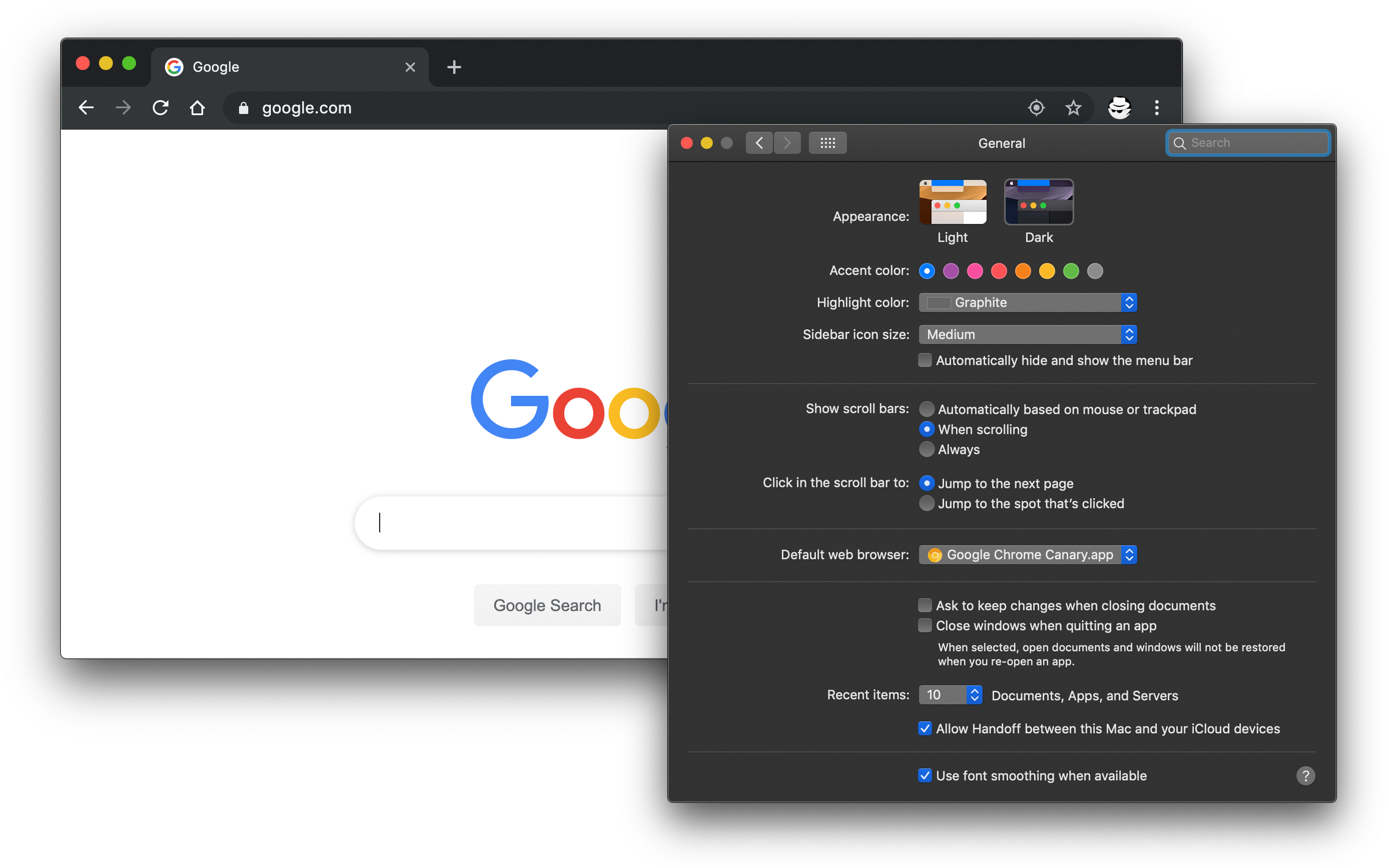macOS 禁用程序的黑色模式/Dark Mode
macOS 禁用程序的黑色模式/Dark Mode
macOS Mojave 中引入了系统层面的黑色模式,Chrome 73 在应用中支行了这一模式,即系统设置为黑色模式时,Chrome 会自动适应切换到 Dark Mode。
 Chrome 跟随系统设置的黑色模式
Chrome 跟随系统设置的黑色模式
很酷对不?
但其实黑色模式下标题与顶部系统菜单融为一体,且黑色模式下 Chrome 标签上内容辨识度也不高了,看起来还是有点别扭。更重要的是,这个模式让人很难区分隐身模式。
 Chrome 黑色模式下与隐身模式的对比
Chrome 黑色模式下与隐身模式的对比
所以决定系统使用 Dark Mode 的情况下将 Chrome 的黑色禁用。
通过命令行中设置 defaults 值可达到目的。
$ defaults write com.google.Chrome NSRequiresAquaSystemAppearance -bool Yes
如果想恢复默认,只需要将刚才设置的值删掉或者将 Yes 设置成 No。
$ defaults delete com.google.Chrome NSRequiresAquaSystemAppearance
禁用任意 App 的 Dark Mode
推而广之,不仅可禁止 Chrome 进入 Dark Mode,还可让其他任意 App 不进入 Dark Mode,如果该应用支持过 Dark Mode 的话。只需要找出该应用的打包发布的 bundle id 即可。这个 id 可通过下面的命令来得到。比如查看 Canary 版本的 Chrome:
$ osascript -e 'id of app "Google Chrome Canary"'
com.google.Chrome.canary
其中 Google Chrome Canary (不区分大小写)是你在程序文件夹下看到的 .app 后缀的那个文件的文件名,比如这里 Google Chrome Canary.app。得到的 id 为 com.google.Chrome.canary 再代入最上面的命令中即可。
程序 bundle id 的查找
更为准备的方式,查找 id,是通过右键 .app 文件选择 Show Package Contents,然后找到 Contents>info.plist 文件,搜索 CFBundleIdentifier 即可看到该程序的 bundle id。
$ defaults write com.google.Chrome.canary NSRequiresAquaSystemAppearance -bool Yes
这里 id 是区分大小写的,写错不生效。
要恢复默认时同理。
一些常用软件
- 网易云音乐
同理,设置网易云音乐关闭其黑色模式,通过 plist 文件发现其 bundle id 为 com.netease.163music,
...
<key>CFBundleIdentifier</key>
<string>com.netease.163music</string>
...
设置:
defaults write com.netease.163music NSRequiresAquaSystemAppearance -bool Yes
- iBooks:
defaults write com.apple.iBooksX NSRequiresAquaSystemAppearance -bool Yes
- Xcode:
defaults write com.apple.dt.Xcode NSRequiresAquaSystemAppearance -bool YES
- Notes:
defaults write com.apple.Notes NSRequiresAquaSystemAppearance -bool Yes
其他默认值
通过 defaults read 可查看到所有应用已经存在的的 defaults 值。
$ defaults read >> defaults.txt
打开 defaults.txt 后搜索相应 app 的 id 可看到其所有可用值的列表。比如搜索 com.google.chrome
{
"com.google.Chrome" = {
KeychainReauthorizeInAppSpring2017 = 2;
KeychainReauthorizeInAppSpring2017Success = 1;
LastRunAppBundlePath = "/Applications/Google Chrome.app";
...
};
"com.google.Chrome.canary" = {
KeychainReauthorizeInAppSpring2017 = 1;
KeychainReauthorizeInAppSpring2017Success = 1;
LastRunAppBundlePath = "/Applications/Google Chrome Canary.app";
...
};
}